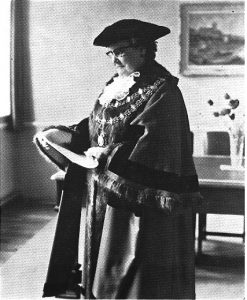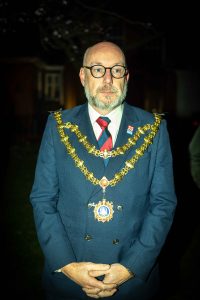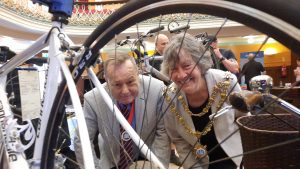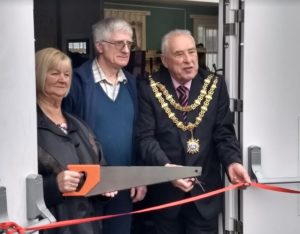The role of Bridgwater Mayor was last reviewed in 2016. A new review was ordered and brought to Full Town Council in May 2023 and approved. It is outlined below and agreed that the following broad outline of Mayors roles and protocols be noted;
Mayoralty Review 2023

The origin of the word Mayor comes from the early days of Local Government and indicates the ‘first citizen’ of a town often mirroring the Head of State with appropriate ceremonial apparel. The role of Mayor was originally that of Feudal Lords right hand man in the towns and cities to carry out Norman justice – however, as towns became more self-governing with the rise of capitalism and the drift from the rurality to the urban centres Mayors and Corporations acquired a stronger sense of local self-identity. This was the case with Bridgwater which received charters from the king (John as it happens) and subsequently created its first mayor (John Kendale) in 1468. In the 19th century a series of Municipal Corporations acts regulated the powers of the mayors and emphasised the ceremonial, civic and representational functions whilst ‘Leaders of Council’ drawn from the leaders of the majority political group have assumed the political lead role.
Today there are basically 2 types of Mayors.
- The Executive Leader of a council, directly elected by the people to take key decisions. This is more common in major cities – London, Manchester, Bristol etc. This is a paid role with considerable executive powers. This is NOT on offer.
- The Ceremonial Mayor – This is the model we have in Bridgwater. This is what is on offer.
A Ceremonial Mayor in the 21st Century

The legal minimum role of a Chair’ (man) of a Town Council is to Chair meetings. They can, if they wish, designate themselves ‘Mayor’. That’s what we do here in Bridgwater. A Ceremonial Mayor is elected annually by elected councillors from their own number. Their role is entirely ‘civic’ and ‘ceremonial’. To provide some historic continuity they ‘may’ choose to preserve and promote the Mayoral traditions of the Town through various means and at their own discretion.
In Bridgwater we have held several reviews, the last ones being in 2016 and again in 2020, during which the key areas involving the Mayoralty were discussed and the following protocols established.
- An incoming Mayor should serve a minimum of 2 years before being considered for the role.
- An incoming Mayor should announce what he or she intends to do ‘before’ being elected so that the other councillors can decide if they believe it is appropriate. This should relate to any changes in traditional duties and expectations as below
- An annual Mayor Making ceremony where the incoming Mayor is robed and chained and formally replaces the outgoing Mayor. This has usually been done in the Town Hall but has in the past sometimes been done in St Mary’s church – which was met with criticism as it gave it religious overtones. The event has usually been accompanied by a lavish free ‘banquet’ of food and drink. All Mayors have done this to different levels, some with music or entertainment. The avowed purpose is networking for the launch of the civic year and promotion of the new mayor. It is not however compulsory nor is its format. Often the Mayor has used the guest list to bring family and friends as a ‘perk’ for starting a civic year, but also has included key community leaders and groups around the town.
- Council elects the Mayor annually denoting the ‘civic year’. Some communities do 2-year terms, we may wish to consider this as an option.
- A Mayor can choose a ‘Mayoress’ or ‘Consort’. While this stems from some Medieval promotion of the notion of ‘Family’ it is not an official or elected role with any democratic authority or powers. It does not need to be another councillor and can in fact be anyone. Whilst there is no official status to the role it can be a helpful ‘assistant’ role in attending functions. The Consort or Mayoress has a badge on a ribbon (should they wish to wear it)
- The Council will have a ‘Deputy Mayor’ appointed from other councillors by other councillors and is expected to be in preparation for taking on the Mayoral role in the next civic year. However, both Mayor and Deputy must be officially elected at annual council meeting, which must be in May.
- The Mayor has the support of a ‘Mayor’s Secretary’ to maintain a diary’ and this is used to book the Mayor -in robes if requested, and/or chains, to attend functions within the community at the Mayors discretion. The number of functions a Mayor has to attend varies considerably as each Mayor can say yes or no. At the last count this varied from 130 to 250 a year. BTC Mayor’s Secretary is currently Amy Storey.

Mayor Tony Heywood and Klaus Geleitzke of the British Legion on Armistice day 2020 - The Mayor is expected to attend major civic events such as Remembrance Day and events on the town social calendar such as opening of Bridgwater Fair.
- The Mayor may consider having a ‘Mayor’s Chaplain’. This is not compulsory. The ‘purpose’ of a chaplain is to be the Mayors ‘spiritual advisor’, but the origin is steeped in the links between the church and state and is symbolic of the role of the Church of England. Often Mayors have chosen a chaplain just because they believe they are following tradition (even if they’re not religious themselves). Others have chosen none CofE chaplains. Others have chosen not to have them at all.
- Some Bridgwater Mayors have had ‘Mayors Cadets’. This is not compulsory nor common. Nor even traditional as it was brought in during the early 2000s by Mayor Bill Monteith who had a particular interest in the military. The purpose was to instil the image of an association between the civic authority and the armed forces. For several years there was a rotation of service branch – army, sea cadets, air cadets, who took the role.
- There has been a ‘Mayors Mace Bearer’. The historic role of said mace was as a weapon for a Sergeant at Arms to carry whilst protecting the Mayor when he collected taxes. Bridgwater has 3 Maces which all date from the 17th century. It is rare to utilise the mace bearer. Currently it is nominally carnival supremo Chris Hocking but he attends only for mayor making and remembrance. Having a macebearer is not compulsory.
- The Mayor’s attire has traditionally been red robes lined with ermine or similar. There are (or were) a number of robes in the Town Hall, some which previous Mayors had even bought as their own. Sometimes it has been the case that former Mayors can attend ceremonies wearing said robes if available. There is further Mayoral attire including a 18th century bi-corn hat. The antiquated purpose of such hats was to denote officers in the British army from the 18th century up until World War 1. There is no obligation to wear this, but it’s available. Apart from Cllr Redman being the first Mayor to wear jeans and chains, no other Mayor has sought to change the dress code of the Mayor. There are 2 Mayors hats and 4 sets of gloves. Some Mayors offer their ‘robes’ for visiting student groups to ‘try on’ which usually proves popular. New robes were purchased in 2020 which do not contain animal fur.

Bridgwater Mayor Ken Richards with Czech and Italian partners - The Mayor has a ‘Mayor’s Parlour’. This has changed considerably from only a few years ago when Bridgwater Mayors ran kitchen/bars and served free drinks and snacks to visiting groups (and after every town council meeting) as a key part of their functions. The new Mayors office is simply that, a stock room with desk and chair for storage of Mayoral effects and personal meetings if required. It adjoins the ‘Bridgwater Room’ where ‘Mayoral functions’ could take place.
- Mayor’s charity. It has been tradition that the Mayor announces a charity and specifically fundraises for that during the year. This isn’t compulsory, nor does it preclude other charities. The Mayor must hand over to the BTC office all money raised at year end.
- Mayors Oath -In 2007 the incoming Tory Mayor Phil Smeed tried to revive a ‘Mayors Oath’ which was based on one from 1787. A couple of subsequent Mayors attempted to continue this, but it fell into non-use. There is no legal basis for it and was really an attempt to emphasise law and order. It has been discontinued. However, the chair (Mayor) must undertake a declaration of acceptance of office.
- Twinning – the Mayor is not obliged to travel to twin towns, but it can be seen as a good promotion of the town. Similarly, the Mayor may choose to host incoming guests from our twin towns in whatever format they feel appropriate. Foreign visits must come from the Mayor’s budget.
- Gifts – traditionally Mayors have made a point of giving gifts – largely those promoting the town, to visiting dignitaries, and to other groups or individuals as appropriate. There is a BTC stock of appropriate promotional materials.
- Annual Town Meeting – it is the duty of the Mayor to call and make arrangements for an annual meeting of the towns people towards the end of a civic year and to set the agenda. (This must be held between 1 March and 1 June)
- The Mayor has been designated as the person who decides on the award of the ‘Bridgwater Cup’ each year as well as a recently introduced ‘Best Xmas shop window award’.
- The Mayor has traditionally been given first option on hosting a civic gathering in the town hall upper rooms to watch the Carnival from. This has in the past ranged from invited guests from twin towns, to business and community leaders or to friends and family.
- The Mayor is called upon to turn on the Christmas lights, and to attend the annual fireworks
- Some Mayors choose to support stage performances by purchasing group tickets and are invited to attend town hall shows in chains.
- Christmas Lunch for Town Council Staff – this is a recent innovation whereby the Mayor thanks council staff with a buffet.

Mayor’s Finances
In 2019 the Mayoral review changed the financing of the Mayor’s office and made it more accountable and less at the discretion of the Mayor. Previously the Mayor would have had an allowance of c. £8,500 paid to them in monthly cheques which they could utilise for functions, or, in fact, pocket.
Today the finances work like this…..
Chairman’s (Mayor’s) Allowance
(The legal bit). A local council may pay its chairman a reasonable allowance to enable him or her to meet the expenses of his or her office. The amount should be fixed by the council in advance and represent reasonable reimbursement to the chairman for the general duties of his or her office – communicating with the clerk, attending events in his or her public figure role, etc. (LGA1972 s. 15(5) and s. 34(5).) An out-of-pocket expenditure budget of £5,000. There is a separate £4,000 budget for events that Mayor may choose to hold.
Permitted expenditure.

Whilst representing the town the following list is legitimate expenditure for which there will be reimbursement:
- Mileage to and from events
- Tickets for events
- Raffle/draw tickets
- Donations to charity stalls, etc.
- Reasonable clothing allowance for civic events (this will be restricted to a new outfit at the start of the term and hire of specific outfits, such as, fancy dress
- Telephone, stationery, and printing; and
- Reasonable expenditure required for performing the Mayor’s duties in service of the Town e.g. travel and hotel costs and meal allowance for twining visits

It is recognised that the Mayor may be accompanied to many formal engagements by his or her spouse or partner.
Reasonable expenditure under the above headings in respect of the Mayor’s spouse or partner represents legitimate expenditure.
It is expected that where possible receipts will support expenditure. Where it is not possible to provide receipts, signed written details must be provided by the Mayor to substantiate the expenditure.




